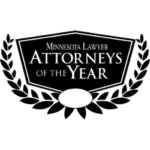Minneapolis Bankruptcy Lawyer
If you’re burdened with unmanageable debt or facing foreclosure, garnished wages, or legal action from creditors, you have options. Bankruptcy allows you to wipe your debts clean and start over.
A qualified Minneapolis bankruptcy lawyer can analyze your financial situation, determine the best path for you, and help you navigate this complex process.
Whether you’re considering a Chapter 7, Chapter 11, or Chapter 13 bankruptcy, contact the experienced attorneys at Milavetz Injury Law, P.A., for a free, no-obligation consultation.

Home » Minneapolis Personal Injury Lawyer » Bankruptcy
- Bankruptcy allows you to clear unmanageable debt, giving you a financial “fresh start.”
- Chapter 7, Chapter 11, and Chapter 13 are the three types of bankruptcy.
- Bankruptcy can reduce the amount you owe to creditors, but it may not relieve debt from student loans, back taxes, alimony obligations, or back child support.
- A bankruptcy will remain on your credit report for up to 10 years.
Bankruptcy is a legal process that helps debtors eliminate or repay their debts. It allows individuals to discharge certain debts related to credit cards, payday loans, medical bills, and unsecured loans. Meanwhile, they can develop a repayment plan to pay off other debts or catch up on late payments.
If you’re struggling with overwhelming debt and considering bankruptcy, speak with a Minneapolis bankruptcy lawyer from Milavetz Injury Law, P.A. Our attorneys will evaluate your situation, recommend the best course of action, walk you through the process, file your paperwork, and represent you throughout your case.
Why File for Bankruptcy in Minneapolis?
Minnesotans who turn to bankruptcy often do so as a last resort amid mounting debt from a job loss, divorce, accident, illness, or other misfortune. Unmanageable debt may result in lawsuits by creditors seeking repayment, even through garnishing your wages. If you’re facing threats of foreclosure, using one credit card to pay off another, or dealing with creditors who have judgments against you, it may be time to consider hiring a Minnesota bankruptcy lawyer.
Common Types of Bankruptcy Filings
Filing for bankruptcy is a complex process. There is no one-size-fits-all solution for those in debt. Our qualified Minneapolis bankruptcy lawyers can analyze your situation and determine which type of bankruptcy will best meet your needs. Chapters 7, 11, and 13 are the types of bankruptcy applicable to consumers.
Chapter 7
Chapter 7, also known as liquidation, is the most common form of bankruptcy for individuals. In these cases, a court-appointed trustee will oversee the sale of your assets to pay off creditors. Minnesota law provides multiple protective exemptions for motor vehicles, certain personal property, and public benefits, shielding them from distribution to your creditors. Generally, the remaining balances of your debt will be discharged. However, some debts are ineligible for discharge.
To file Chapter 7, you cannot have earnings that exceed the income threshold outlined by the court’s means test. You also cannot have filed for this type of bankruptcy within the past eight years.
Chapter 11
Chapter 11 allows debtors to reorganize and restructure their obligations. This type of bankruptcy typically applies to businesses. However, in rare cases, high-income individuals who do not meet Chapter 7 or Chapter 13 criteria may apply for Chapter 11.
Under this form of bankruptcy, there is no minimum or maximum amount of debt for eligibility, nor is there an income requirement. In a Chapter 11 case, the debtor files a proposed plan to repay the debts.
Chapter 13
In a Chapter 13 bankruptcy, also called individual debt adjustment or personal reorganization, the filer proposes a debt repayment plan. Typically, you’ll pay off as much of your debt as possible within three to five years. A trustee will serve as your go-between with the creditors. They’ll oversee your progress and distribute the money owed.
Chapter 13 filers must have regular incomes and less than $2.75 million in combined secured and unsecured debts. This form of bankruptcy appeals to those who want to make up missed payments, protect their credit, and keep their assets.
Pros & Cons of Bankruptcy
Before filing for bankruptcy, consider the benefits and drawbacks of taking this course of action.
Pros
- You’ll get protection from creditors’ actions with an automatic stay.
- A bankruptcy attorney and trustee can help you navigate the process.
- Debts may be reduced or completely erased.
- Bankruptcy can prevent future legal issues.
- You might settle debts for less than the amount owed.
- Under certain types of bankruptcy, you can keep your home and belongings.
Cons
- Bankruptcy may not resolve specific debts, such as certain student loan payments, child support, or alimony.
- The process can take months or years.
- Your credit score, interest rates, and future rental prospects may be negatively impacted.
- Some types of bankruptcy require you to liquidate valuable assets.
- Co-signers may be held liable for your debts.
- Bankruptcies are matters of public record and remain on your credit report for up to a decade.
How To File for Bankruptcy in Minnesota
Bankruptcy is a federal matter governed by Title 11 of the U.S. Code. These cases are handled by the United States Bankruptcy Court, not local Minnesota courts. The process typically involves the following steps:
- Compile all your financial documents, including your two most recent tax returns, 60 days of pay stubs, latest bills, and recent bank statements.
- List all outstanding financial obligations, dividing them into secured and unsecured debts.
- Take a credit counseling course from a provider approved by the state of Minnesota and retain your certificate of completion.
- Complete the required forms. File the paperwork with the Minnesota Bankruptcy Court. The filing fee can be split into multiple payments or waived based on your situation.
- From there, follow the instructions provided to you by the court. Depending on the type of bankruptcy, you may need to attend a meeting of creditors, take a financial management course, or communicate with your trustee.
While you can file bankruptcy without a lawyer, hiring an experienced and skilled bankruptcy attorney is advisable. Bankruptcy law is complex, and the process is difficult to navigate. A lawyer can protect your rights, advocate for your best interests, ensure you get a discharge for all eligible debts, and protect all exempt assets.
Contact Our Minneapolis Bankruptcy Attorneys
Since 1963, Milavetz Injury Law, P.A. has helped Minnesotans regain control of their finances. Our Minneapolis bankruptcy team, led by Barbara Nevin and Walter Hodynsky, will bring a seasoned perspective to your financial situation, providing sound advice and exceptional representation.
Barbara Nevin was one of the plaintiffs in the landmark U.S. Supreme Court case Milavetz Injury Law, P.A. v. United States, which narrowed portions of the Bankruptcy Reform Act to make it more fair to consumers. Her deep knowledge of liquidation and reorganization has earned her recognition from prestigious organizations, including being named a Minnesota Super Lawyer for every year since 2005.
Our clients also value the expertise of Walter Hodynsky, who specializes in debt relief and bankruptcy. Together, Ms. Nevin and Mr. Hodynsky give clients the tools they need to make a fresh start.
If you feel overwhelmed by financial strain, we’re here for you. At Milavetz Injury Law, P.A., we built our reputation by helping everyday people navigate tough times like these. Contact us today to schedule your free consultation with a Minneapolis bankruptcy lawyer.
Discuss Your Legal Questions With A Member Of Our Team
"*" indicates required fields




Speak to an Attorney Today
Let Us Help You With Your Financial Help & Compensation Options

